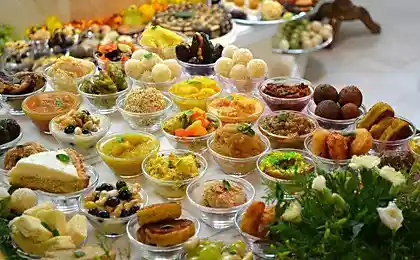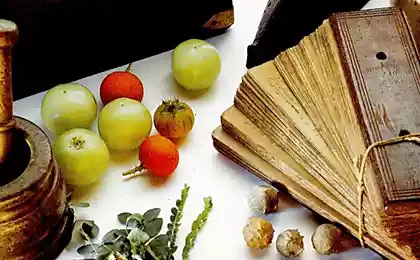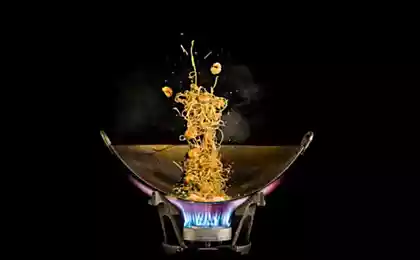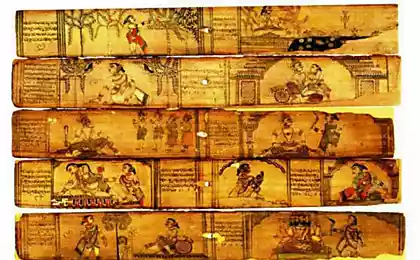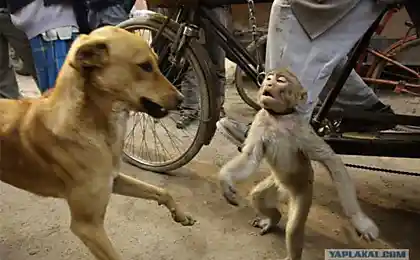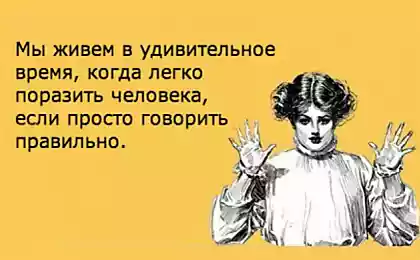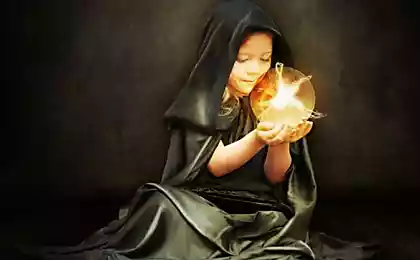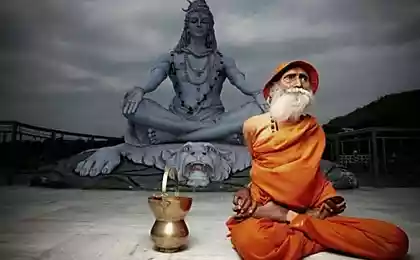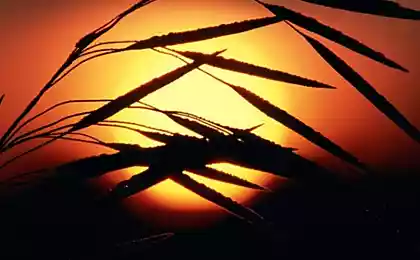2503
A Sanskrit scholar Durga Prasad Shastri: do You speak a modified form of Sanskrit!
In the early 60-ies of the 20th century, Russia was visited by an Indian Sanskrit scholar Durga Prasad Shastri. After two weeks, he said to the interpreter.Guseva): Stop translating! I understand what you are saying. You are speaking here some corrupted form of the Sanskrit! (No need to translate! I understand what you're saying. You speak a modified form of Sanskrit!). After returning to India, he published an article about the affinity of Russian and Sanskrit.
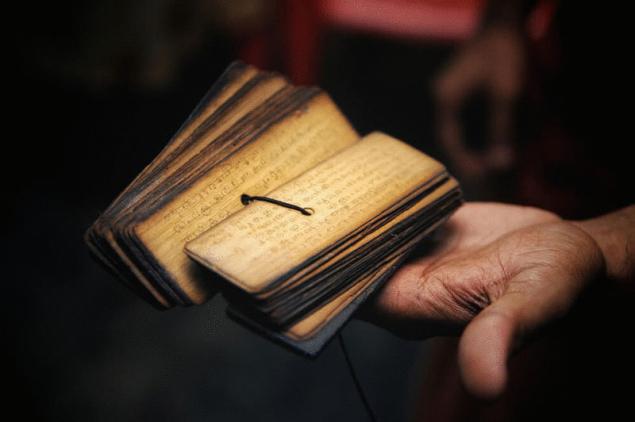
"If I were asked which two languages are most similar to each other, I would answer without hesitation: Russian and Sanskrit. And not because some words ... like... Common words can be found in Latin, German, Sanskrit, Persian and Russian language... it is Surprising that in our two languages are similar word structure, style and syntax. Add more similarity rules of grammar. It is a matter of deep curiosity for all who are familiar with linguistics...
"When I was in Moscow, at the hotel I was given keys to room 234 and said "dwesti tridsat chetire". In disbelief I couldn't understand if I was standing in front of a cute girl in Moscow or in Benares or Ugine somewhere two thousand years ago. In Sanskrit 234 will "dwishata tridasha chatwari". Is it possible the greater the similarity? You will hardly find two more different languages that preserve the ancient heritage – so close pronunciation to the present day.
"I had the opportunity to visit the village of Nachalovo, about 25 km from Moscow, and to be invited to dinner in a Russian peasant family. The elderly woman introduced me to a young couple, saying in Russian, “On moy i seen ona moya snokha” (He is my son and she is my daughter-in-law).
"As much as I wanted a Panini, the great Indian grammarian, who lived about 2600 years ago, could be here with me and hear the language of his time, so miraculously saved, with all the minutest intricacies!
"Russian word seen (the son) is the son in English and in Sanskrit sooni... Russian word snokha is a Sanskrit snukha that can be pronounced the same way as in Russian. The relationship between son and the wife of the son is also described similar words in two languages...
"Here's another Russian expression: To vash dom, etot nash dom (That is your home this is our home). In Sanskrit: Tat vas dham, dham etat nas... Young Indo-European, such as English, French, German, and even Hindi, directly derived from the Sanskrit, must apply the verb is that without which the above proposal can not exist in any of these languages. Only Russian and Sanskrit without verb-bundles is, while remaining completely correct, both grammatically and idiomatically. The word itself is similar to est in Russian and Sanskrit asti. And even more than that, Russian and Sanskrit estestvo astitva means in both languages "exist"... not only Similar syntax and word order, the expressiveness and spirit is retained in these languages, in unaltered original form...
"In European and Indian languages have no such means of preserving the ancient language systems, as in Russian. It's time to focus on the study of the two largest branches of the Indo-European family and discover some dark Chapter of ancient history for the benefit of all peoples."
Call this scientist has inspired few researchers to penetrate deeper into the ancient connection of the Russian North, the ancestral home of Indo-Europeans, and modern cultures of Europe and Asia.
Russian language – Sanskrit (transcription of Russian letters)
And
ad(b) ad (to eat, to swallow)
artel Arti (root, “Rita” — “the order”)
B
mischief, childish – Balata (childhood)
white, light – Balaka
Shine – bklas
God (Milosevic) – BHAGA
goddess, Deva, Devi, deviantly – Bhadra
the fear of Bhuj, bhes
fear – BHI, BHAs
the battle, the battle wound
brother – phratry, phratry
brotherhood – Bratstvo
take BHR
to brezite – phrag
eyebrow – baruwa
to Wake, to awaken the budha
to gurgle, to dive, to sink – bul
Buran – bharana
beads (fog) bus
be – BHU
byvanie – bhavana, bhavya
In
Waga (weight, heaviness) Waha (carrying cargo)
shaft – shaft
roller – Wali
VAPA (paint, decoration) – APUS (beauty)
cooking – var (water)
brews (corral) – var (fence)
you – you
to manage the introduction (knowledge) – view of the Vedas, Veda, Veda
sage – vedin
widow – vidhava
spring – Vasanta
the entire (village) – vish
all – Vishva
wind (blowing) – Vata, Vayu
over the air loop – pylon
broadcasting (speech) – Vacha
broadcast – vach
winnow – VA
the turn – WRT, Jew's harp
water Wudang, var, beer
led, lead – VAD
to carry (on the cart) – wah
wolf – vrika
a wave of excitement – shaft
hair – shaft
question (to ask) – Prasna, pacch
the gate turn – Vartan
rider sadin
always garden
drop – avaad
to place, delete Vista
knit loop – West
blather (to say) – VAK
G
guess the bastard (talking optional)
to halite, vomiting (V. Dal) – Gal (pour)
gat (path) – Gati (walking)
read, sound – Glas
to drive the beat – ghna
dialect – GAVI
the mountain gir, gir giri, giri
burning, flame gherini ghrini
burn ghri ghri
throat gala gala
Rob, grab, rake – graph
the mane, neck – mane
thunderstorm, thunder garja
The word “beef” in Sanskrit no, but a possible way of adding
this Russian word should be seen as two words in Sanskrit:
“Gavia” – “is taken from the cow” and “Adam” – “eating (eating)”.
chest – grid
to gnaw, to devour – Grae
gnawing, jaw – grasan
to Galati, call, finished the art school
Gul – Gul
Gus Hans
D
give, give, Yes, give
the giving – let's
to push, impel – dabh
a tribute, a gift was given
giving Dada, Dadi
two, two, two, two, DWI, DWA
door – dwar
brother-in-law – DeVry
Deva – Devi
tar – dagdha (melted by heat)
day – DIN
wood, timber – Dara
keep – DHR
ten – dasan
Divo (sky radiance) – diva
marvelous – Divya
share (part) – gave
home – ladies
tear, tear – Dr
to fight, to flee – DRA
wood-burning, wood – Dravya
other druch
to dudith (suck) – the spirit
bad, bad – dur
blow (go strive) do
to blow (inflate) – DCU
smoke – dhuma
hole – gift
hole – drica
E
food (adene) – Ada, Adana
to eat, eat hell
W
sting – Jahl (the edge)
wife Jani
live – Jiva
life (belly) – Jivatma
to live – Jiva
(from)ity, old – jita
Z
dawn (praise) – garia
call – Hwa, Hwa
anger, potion – Hel
call the title – hwan
earth – Hema
winter – him
winter, snow – HIMA
know – John
knowledge – Jnana
notable (know) – Gnata
expert – Janaka
sorite, to destroy – HR
And
go – and
the yoke, the yoke – South
silt – silt (soil)
to destroy, to kill – corpse
so, ITAS
To
the barrel – kanduka (capacity)
to say (to say) – Kath
how, what, who – ka
moan – Kahn
Karuna (bird of sorrow) – Karuna (sad)
to touch, to feel – ChUP
cough – Cass
wedge, number Qila
when kada
goat – Mack, Bukka
stake, pole – khila
kopanka, pond – kupaka
clumsy – kharwa
braid (hair) – Kesha
which – Qatar
purse – Kosh
strengthen – clip
multiple – Crato
the peasant – krishika
Creek – crca (throat)
blood – Kravis
bloody – kravia
crush – Kris
twisted – crunch
(a)round – krucha
() krushitsa Cruz
to crucitti, bend – crunch
to cover, cut – KRI (to do)
where – ku, Kutas
fist – fist (five together)
Kulik – Kulik
to curlykat (crane) – chickens (kurakura)
curly – kurcha (curl)
codend – Kut
a lot, a lot (bulge)
L
to get along, play – lad
to caress, hug – Las
light – Laghu.
sculpt, stick – lip
modeling – Lepa
down, down, down, if
lick – Lich
sticky – liptak
only (some) – lish, Alex
fishing, the gathering lava
to babble, to babble lap
love lubh
to hit (damage) loop
beam, Shine – manual
clinging Li
Lalit, undead – Lal
M
whale – whale (head)
mother, mother, mother – matr, Mat, mA
mga – Magna (fading)
honey – Madhu
change – me
Meret, die – Mr
to measure mi
to fade, to mrachnye – MRC
dead – MRTA
month – Mas
fur, fleece – Mesha
stirrer – makrana
to disturb, stir – mix
to disturb, mix – Misr
bag (leather) – Masaka
to be thrilled – mlai
opinion – Manas
imagine, put Mans
wet – IOC
face, appearance (head) – murghan, murdhan Murti, murti
watering much
mouse – fly
to cheat, to steal – mush
meat – Mas
crush, granulate – Matha
N
naked – Nina
sky – Nabha
heaven nabasa
no – ned
no – no
low beads – Niska
lowland – Naina
low – nica
to nicoti die – Nikon (complete)
thread – nitya
to nescot silence – nyship
new – Nava
novina (moon) – Joshua
we, our – us
nail – Naga
nose – NASA
the night nakta
well, well
On
both ubha
fire – Agni
sheep – avika
eye – aksha
awn – asthi
from – UD, ut
to give the udda
separate – Udal
to cough – otcas
open – outcry
an outdoor, opened – otkrita
to leave, to depart – outcall
P
fall pad
PAL (fire) – palitha
dad – dad (defender)
pair of (different) pair
mouth – Pash
of Pequot lakes, heat pack
foam – phena
first – purwa (original)
dog – dog (hungry, eating)
oven – Pacha
cookies – pachana
write – Pisz
drink, feed – PI, PA
Pitot – Pete
swimming – plavan
splash – plus
sail, swim PLU
floating (raft) – rogue
full – Purna
the mother – of premature
nice, cute Priya
to awaken(be) – prabodh
bend – the Prajna
proznav – Prajna
stretch – pastry, str
space – prastara
to heat, to warm up Pratap
stretching – pratan
sprinkle prish prish
vs – Prati
dally – Prahlada
to pranoti – pran
path patha
traveler – pathika
to swell, to grow – push
R
rejoice – grad
to dispel, to vikriti.
wound – Vrana
wounded – branin
grow – pox
Rev – Rav
roar – Rav
rod, have – Rodas (earth)
dew, juice – Rasa
growth – Rokhat
hack – <url>
Rudy (red, red) – rudhra
ruin – rush
cry – Rud
prowl – Pb
With
with with sa
to sit down, to sit – the garden
himself, the most – herself
svara (shouting, noise) – quarrel
sparkle – svar
light, white – Svit (Suite)
bright, white – shweta (light)
your – SVA
property – satwa
brother-in-law – svakiya
father-in-law – svekr (to learn find)
heart – Hridaya
seven (1 l singular) – ASMI
the seed, the grain – Hiran
the power of the spirit – Sila (the force)
narrator – Kahala
to suciwati, mixing piles
drain, spewing – srij
slavlenie – shravana
rumors (glory) – srava
listen, hear, SRU
death – March
death mrityu, Marana
laugh media
snow – sneha (slippery)
daughter-in-law – Sosa
the Cathedral, the meeting of the Sabha
the meeting (General view) – sambacana
salty, bitter – Sola
to society, to pour out Sich, SIC
Soha – spha (stick-corelca)
sleep – swap (lang. Hindi- "sleepy"
drizzle – sprich
sleep – Supta
the mill, Parking – sthana
(to)the brand, ascend – thigh
post – stambha, staph
stand – stha
the essence, the truth – Sathyam
dried – sushi, sushi
drying – shushka, drying
son Sunu, Suna
T
one is this one
nanny, daddy, and Tata
so – and- so
carry () to teskilati – TAS
those you – te
the tad, tat
same – tatsuma
to create crud
to Teplice, warm – tap
heat – Tapa
RUB – RUB
to flow, to move – TEC
then – tada
to torment, to harass – there
thin – Tanaka
to Torit (road) – Tharu
grass – tRNA
tremble – trip
three, third three, TRITA
three – Tris
tro trash
three – trick
to shake, to tremble – tras
tight – Tung
pummel, to beat – tug
to turity, drive – Tur
you – TBA
darkness – Tama
pull – tan
Have
to run, to escape – DRA
die – MRT
to consider, to count – cheat
fabric weft.
X
walk – move
cold, refreshing – chill
the chill, the freshness of hladka
H
slurp – Cham (chew)
slurp (pig) – cuscuta
to chalice (if..,..) – chal
Chara, seductive – charu
Cup – cachaca
four – Chatara
four – catur
repair, do – Chi
crank, a fool – miracle
a bit, a little bit- choot (small fry)
W
tent, shelter – Shala
very shipham
can you Boo – Kishi (calm)
awl – Shira (blade)
sew, ©selawat – SIV
brother-in-law – sasura
E
Eva – Eva
ECA, what is ECA
this – ETAD, Etat
I
the reality of the phenomenon in Java (the phenomenon of the moon)
jagna, lamb is yajña (sacrifice)
pit (late) – Yama
adenle, the eating – Adana
ardent – Jara (lover)
in Russian and Sanskrit “s” and “sh” can be mutually replaced.published
P. S. And remember, only by changing their consumption — together we change the world! ©
Source: www.oum.ru/literature/vedicheskaja-kultura/indiya-po-russki/

"If I were asked which two languages are most similar to each other, I would answer without hesitation: Russian and Sanskrit. And not because some words ... like... Common words can be found in Latin, German, Sanskrit, Persian and Russian language... it is Surprising that in our two languages are similar word structure, style and syntax. Add more similarity rules of grammar. It is a matter of deep curiosity for all who are familiar with linguistics...
"When I was in Moscow, at the hotel I was given keys to room 234 and said "dwesti tridsat chetire". In disbelief I couldn't understand if I was standing in front of a cute girl in Moscow or in Benares or Ugine somewhere two thousand years ago. In Sanskrit 234 will "dwishata tridasha chatwari". Is it possible the greater the similarity? You will hardly find two more different languages that preserve the ancient heritage – so close pronunciation to the present day.
"I had the opportunity to visit the village of Nachalovo, about 25 km from Moscow, and to be invited to dinner in a Russian peasant family. The elderly woman introduced me to a young couple, saying in Russian, “On moy i seen ona moya snokha” (He is my son and she is my daughter-in-law).
"As much as I wanted a Panini, the great Indian grammarian, who lived about 2600 years ago, could be here with me and hear the language of his time, so miraculously saved, with all the minutest intricacies!
"Russian word seen (the son) is the son in English and in Sanskrit sooni... Russian word snokha is a Sanskrit snukha that can be pronounced the same way as in Russian. The relationship between son and the wife of the son is also described similar words in two languages...
"Here's another Russian expression: To vash dom, etot nash dom (That is your home this is our home). In Sanskrit: Tat vas dham, dham etat nas... Young Indo-European, such as English, French, German, and even Hindi, directly derived from the Sanskrit, must apply the verb is that without which the above proposal can not exist in any of these languages. Only Russian and Sanskrit without verb-bundles is, while remaining completely correct, both grammatically and idiomatically. The word itself is similar to est in Russian and Sanskrit asti. And even more than that, Russian and Sanskrit estestvo astitva means in both languages "exist"... not only Similar syntax and word order, the expressiveness and spirit is retained in these languages, in unaltered original form...
"In European and Indian languages have no such means of preserving the ancient language systems, as in Russian. It's time to focus on the study of the two largest branches of the Indo-European family and discover some dark Chapter of ancient history for the benefit of all peoples."
Call this scientist has inspired few researchers to penetrate deeper into the ancient connection of the Russian North, the ancestral home of Indo-Europeans, and modern cultures of Europe and Asia.
Russian language – Sanskrit (transcription of Russian letters)
And
ad(b) ad (to eat, to swallow)
artel Arti (root, “Rita” — “the order”)
B
mischief, childish – Balata (childhood)
white, light – Balaka
Shine – bklas
God (Milosevic) – BHAGA
goddess, Deva, Devi, deviantly – Bhadra
the fear of Bhuj, bhes
fear – BHI, BHAs
the battle, the battle wound
brother – phratry, phratry
brotherhood – Bratstvo
take BHR
to brezite – phrag
eyebrow – baruwa
to Wake, to awaken the budha
to gurgle, to dive, to sink – bul
Buran – bharana
beads (fog) bus
be – BHU
byvanie – bhavana, bhavya
In
Waga (weight, heaviness) Waha (carrying cargo)
shaft – shaft
roller – Wali
VAPA (paint, decoration) – APUS (beauty)
cooking – var (water)
brews (corral) – var (fence)
you – you
to manage the introduction (knowledge) – view of the Vedas, Veda, Veda
sage – vedin
widow – vidhava
spring – Vasanta
the entire (village) – vish
all – Vishva
wind (blowing) – Vata, Vayu
over the air loop – pylon
broadcasting (speech) – Vacha
broadcast – vach
winnow – VA
the turn – WRT, Jew's harp
water Wudang, var, beer
led, lead – VAD
to carry (on the cart) – wah
wolf – vrika
a wave of excitement – shaft
hair – shaft
question (to ask) – Prasna, pacch
the gate turn – Vartan
rider sadin
always garden
drop – avaad
to place, delete Vista
knit loop – West
blather (to say) – VAK
G
guess the bastard (talking optional)
to halite, vomiting (V. Dal) – Gal (pour)
gat (path) – Gati (walking)
read, sound – Glas
to drive the beat – ghna
dialect – GAVI
the mountain gir, gir giri, giri
burning, flame gherini ghrini
burn ghri ghri
throat gala gala
Rob, grab, rake – graph
the mane, neck – mane
thunderstorm, thunder garja
The word “beef” in Sanskrit no, but a possible way of adding
this Russian word should be seen as two words in Sanskrit:
“Gavia” – “is taken from the cow” and “Adam” – “eating (eating)”.
chest – grid
to gnaw, to devour – Grae
gnawing, jaw – grasan
to Galati, call, finished the art school
Gul – Gul
Gus Hans
D
give, give, Yes, give
the giving – let's
to push, impel – dabh
a tribute, a gift was given
giving Dada, Dadi
two, two, two, two, DWI, DWA
door – dwar
brother-in-law – DeVry
Deva – Devi
tar – dagdha (melted by heat)
day – DIN
wood, timber – Dara
keep – DHR
ten – dasan
Divo (sky radiance) – diva
marvelous – Divya
share (part) – gave
home – ladies
tear, tear – Dr
to fight, to flee – DRA
wood-burning, wood – Dravya
other druch
to dudith (suck) – the spirit
bad, bad – dur
blow (go strive) do
to blow (inflate) – DCU
smoke – dhuma
hole – gift
hole – drica
E
food (adene) – Ada, Adana
to eat, eat hell
W
sting – Jahl (the edge)
wife Jani
live – Jiva
life (belly) – Jivatma
to live – Jiva
(from)ity, old – jita
Z
dawn (praise) – garia
call – Hwa, Hwa
anger, potion – Hel
call the title – hwan
earth – Hema
winter – him
winter, snow – HIMA
know – John
knowledge – Jnana
notable (know) – Gnata
expert – Janaka
sorite, to destroy – HR
And
go – and
the yoke, the yoke – South
silt – silt (soil)
to destroy, to kill – corpse
so, ITAS
To
the barrel – kanduka (capacity)
to say (to say) – Kath
how, what, who – ka
moan – Kahn
Karuna (bird of sorrow) – Karuna (sad)
to touch, to feel – ChUP
cough – Cass
wedge, number Qila
when kada
goat – Mack, Bukka
stake, pole – khila
kopanka, pond – kupaka
clumsy – kharwa
braid (hair) – Kesha
which – Qatar
purse – Kosh
strengthen – clip
multiple – Crato
the peasant – krishika
Creek – crca (throat)
blood – Kravis
bloody – kravia
crush – Kris
twisted – crunch
(a)round – krucha
() krushitsa Cruz
to crucitti, bend – crunch
to cover, cut – KRI (to do)
where – ku, Kutas
fist – fist (five together)
Kulik – Kulik
to curlykat (crane) – chickens (kurakura)
curly – kurcha (curl)
codend – Kut
a lot, a lot (bulge)
L
to get along, play – lad
to caress, hug – Las
light – Laghu.
sculpt, stick – lip
modeling – Lepa
down, down, down, if
lick – Lich
sticky – liptak
only (some) – lish, Alex
fishing, the gathering lava
to babble, to babble lap
love lubh
to hit (damage) loop
beam, Shine – manual
clinging Li
Lalit, undead – Lal
M
whale – whale (head)
mother, mother, mother – matr, Mat, mA
mga – Magna (fading)
honey – Madhu
change – me
Meret, die – Mr
to measure mi
to fade, to mrachnye – MRC
dead – MRTA
month – Mas
fur, fleece – Mesha
stirrer – makrana
to disturb, stir – mix
to disturb, mix – Misr
bag (leather) – Masaka
to be thrilled – mlai
opinion – Manas
imagine, put Mans
wet – IOC
face, appearance (head) – murghan, murdhan Murti, murti
watering much
mouse – fly
to cheat, to steal – mush
meat – Mas
crush, granulate – Matha
N
naked – Nina
sky – Nabha
heaven nabasa
no – ned
no – no
low beads – Niska
lowland – Naina
low – nica
to nicoti die – Nikon (complete)
thread – nitya
to nescot silence – nyship
new – Nava
novina (moon) – Joshua
we, our – us
nail – Naga
nose – NASA
the night nakta
well, well
On
both ubha
fire – Agni
sheep – avika
eye – aksha
awn – asthi
from – UD, ut
to give the udda
separate – Udal
to cough – otcas
open – outcry
an outdoor, opened – otkrita
to leave, to depart – outcall
P
fall pad
PAL (fire) – palitha
dad – dad (defender)
pair of (different) pair
mouth – Pash
of Pequot lakes, heat pack
foam – phena
first – purwa (original)
dog – dog (hungry, eating)
oven – Pacha
cookies – pachana
write – Pisz
drink, feed – PI, PA
Pitot – Pete
swimming – plavan
splash – plus
sail, swim PLU
floating (raft) – rogue
full – Purna
the mother – of premature
nice, cute Priya
to awaken(be) – prabodh
bend – the Prajna
proznav – Prajna
stretch – pastry, str
space – prastara
to heat, to warm up Pratap
stretching – pratan
sprinkle prish prish
vs – Prati
dally – Prahlada
to pranoti – pran
path patha
traveler – pathika
to swell, to grow – push
R
rejoice – grad
to dispel, to vikriti.
wound – Vrana
wounded – branin
grow – pox
Rev – Rav
roar – Rav
rod, have – Rodas (earth)
dew, juice – Rasa
growth – Rokhat
hack – <url>
Rudy (red, red) – rudhra
ruin – rush
cry – Rud
prowl – Pb
With
with with sa
to sit down, to sit – the garden
himself, the most – herself
svara (shouting, noise) – quarrel
sparkle – svar
light, white – Svit (Suite)
bright, white – shweta (light)
your – SVA
property – satwa
brother-in-law – svakiya
father-in-law – svekr (to learn find)
heart – Hridaya
seven (1 l singular) – ASMI
the seed, the grain – Hiran
the power of the spirit – Sila (the force)
narrator – Kahala
to suciwati, mixing piles
drain, spewing – srij
slavlenie – shravana
rumors (glory) – srava
listen, hear, SRU
death – March
death mrityu, Marana
laugh media
snow – sneha (slippery)
daughter-in-law – Sosa
the Cathedral, the meeting of the Sabha
the meeting (General view) – sambacana
salty, bitter – Sola
to society, to pour out Sich, SIC
Soha – spha (stick-corelca)
sleep – swap (lang. Hindi- "sleepy"
drizzle – sprich
sleep – Supta
the mill, Parking – sthana
(to)the brand, ascend – thigh
post – stambha, staph
stand – stha
the essence, the truth – Sathyam
dried – sushi, sushi
drying – shushka, drying
son Sunu, Suna
T
one is this one
nanny, daddy, and Tata
so – and- so
carry () to teskilati – TAS
those you – te
the tad, tat
same – tatsuma
to create crud
to Teplice, warm – tap
heat – Tapa
RUB – RUB
to flow, to move – TEC
then – tada
to torment, to harass – there
thin – Tanaka
to Torit (road) – Tharu
grass – tRNA
tremble – trip
three, third three, TRITA
three – Tris
tro trash
three – trick
to shake, to tremble – tras
tight – Tung
pummel, to beat – tug
to turity, drive – Tur
you – TBA
darkness – Tama
pull – tan
Have
to run, to escape – DRA
die – MRT
to consider, to count – cheat
fabric weft.
X
walk – move
cold, refreshing – chill
the chill, the freshness of hladka
H
slurp – Cham (chew)
slurp (pig) – cuscuta
to chalice (if..,..) – chal
Chara, seductive – charu
Cup – cachaca
four – Chatara
four – catur
repair, do – Chi
crank, a fool – miracle
a bit, a little bit- choot (small fry)
W
tent, shelter – Shala
very shipham
can you Boo – Kishi (calm)
awl – Shira (blade)
sew, ©selawat – SIV
brother-in-law – sasura
E
Eva – Eva
ECA, what is ECA
this – ETAD, Etat
I
the reality of the phenomenon in Java (the phenomenon of the moon)
jagna, lamb is yajña (sacrifice)
pit (late) – Yama
adenle, the eating – Adana
ardent – Jara (lover)
in Russian and Sanskrit “s” and “sh” can be mutually replaced.published
P. S. And remember, only by changing their consumption — together we change the world! ©
Source: www.oum.ru/literature/vedicheskaja-kultura/indiya-po-russki/
Dora Nass: Learning to recognize evil before it becomes invincible
Kebab denatured — acid marinade deploys peptide chain
